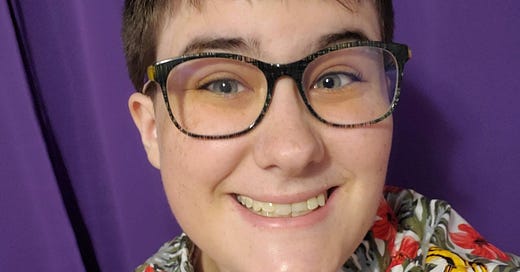The Trump regime coming after autistic people (or anybody with a disability) should not surprise you in the least. Any time periods of social progress hits, we’re bound to see immense regression in response. The rates of diagnosed autism have increased, finally including people AFAB and people of color in more proportional rates (though there’s still a long way to go) and now we are seeing a resurgence of pushback as well as the use of autism as an insult and derogatory terms such as the r-word re-ingrained into the public lexicon.
I’m not shy about my autism diagnosis, nor do I ever intend to be again. I was diagnosed at such a young age that I wasn’t told until I was an age where I could understand (around 6 or 7), and for the next decade, I was socially conditioned to feel shame around my diagnosis to a point where I avoided seeking help for co-occurring mental conditions I had as I thought the symptoms I was experiencing were just a part of being autistic.
I started being open about my diagnosis after a high school teacher revealed it to my entire class without prior permission. I kind of took the attitude of “well I’ve got nothing to hide anymore”. During this time, I started exploring more of what it meant to be autistic, and a lot of my advocacy in the first few years was very rigid and centered around common community talking points.
As I grew into adulthood, however, I started to form more nuanced views that not only more closely aligned with my disability but took into account disparities in people’s differentiated backgrounds and lived experiences. A lot of questions that, beforehand had black and white answers in my mind, were soon replaced with answers of “it’s actually kind of complicated.”
The past two years, I’ve spent my time doing research on autism itself in an attempt to better understand myself. One thing I learned was that I was a lot more affected by my disability than I originally thought, and the success I’ve had can be largely attributed to privileges I hold in race and class as well as some level of hard work on my part. I’ve also learned how to better understand autism in a working world.
My first project, “Teaching Percussion to Students on the Autism Spectrum”, sought to understand the barriers in learning that autism may provide to a percussionist (which happened to me), as well as how to overcome those barriers. I first decided on this senior capstone topic as a way to give future instructors I may have a guide for how to teach me, but a lot of people took interest in the project which led to me being able to present at a variety of universities as well as PASIC 2024. Where I’ve gone from there is basically just applying those principles to my teaching, and hopefully I’ll get to use them more in the future.
My second project, “How can we make Truman better for autistic students?” Came from my experiences as an autistic college student and getting to know other autistic college students. Based on other programs around the country, I created a prototype program that will hopefully someday springboard into something official at Truman. This project took me 1000 miles east to Philadelphia to work as a graduate assistant for a well-established college autism program similar to the one I proposed.
My most recent project is a multi-year, multi-step project targeting self-determination and self-advocacy skills in autistic teens and young adults. It doesn’t even have a name yet. The first part of my project is better understanding emotional regulation and executive functioning, which I feel are under addressed when working with autistic teens and adults, and allowing that to shape my process. I love talking about my research, doing literature reviews (despite the ultra-annoying citations), and I hope to someday design studies to better understand the answers to my questions.
I wear a lanyard with a pin on it that says “I’m autistic, please be patient.” I don’t mind people knowing, even though the world is likely going to get even worse for autistic people. First of all, I can’t hide it. I’m horrible at masking, and even with a convincing mask, studies show that neurotypical people can still tell when someone is autistic (and usually harbors implicit biases about the person). Second of all, why would I want to? I’m claiming the agency back that was stolen from me the first 16 years of my life. Finally, I hope that I can be a role model to people. I hope that one of my students or someone I work with in my future jobs can see someone in a leadership role being open about their diagnosis and not only see representation of themselves in a leadership role but also understand that those achievements may be possible for them too.



